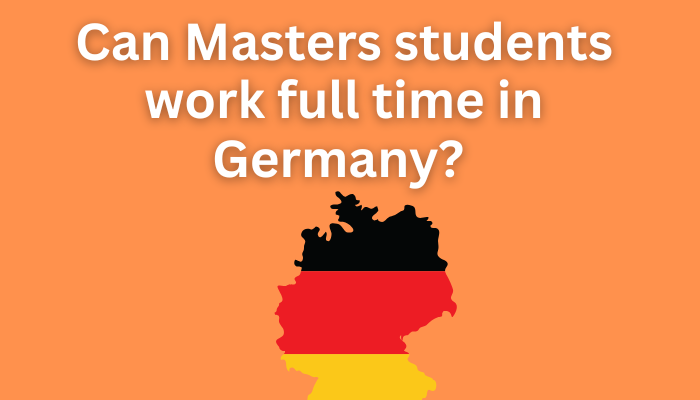Germany is one of the most popular destinations for international students due to its high-quality education system, diverse student population, and strong job market. Many students choose to pursue their master’s degrees in Germany for various reasons, including the affordability of education, the availability of numerous scholarships, and the opportunity to gain valuable work experience in a thriving economy. However, one question that often arises among international students is whether master’s students can work full-time in Germany. In this article, we will explore the work regulations for international master’s students in Germany, focusing on their ability to work full-time, part-time opportunities, and important considerations.
Work Regulations for International Students in Germany
Germany offers excellent opportunities for international students to gain work experience during their studies. In general, students in Germany are allowed to work while studying, but there are specific regulations that govern how much they can work, especially when it comes to full-time employment. International students on student visas, including those pursuing master’s degrees, are subject to certain rules set by the German government, which limit the number of hours students can work, particularly during the semester.
Full-Time Work During the Semester
For international students in Germany, working full-time during the academic semester is generally not allowed. Students are restricted to working part-time while attending classes in order to focus on their studies. The regulations governing the number of hours students can work depend on whether they are from the European Union (EU) or non-EU countries.
- Non-EU Students: Non-EU students who hold a student visa are permitted to work up to 120 full days or 240 half-days per year. A full day is defined as working for eight hours or more in a single day, while a half-day is any amount of work up to four hours. This means that, during the semester, students can work a maximum of 20 hours per week. The 120 full days or 240 half-days are meant to be spread out throughout the year, so students should plan their work hours accordingly. Non-EU students are allowed to work more than 20 hours per week during official semester breaks (for example, summer or winter breaks), as long as they do not exceed the annual limit of 120 full days. During these breaks, students can work full-time (up to 40 hours per week) without violating the conditions of their visa.
- EU Students: EU students have more flexibility when it comes to working while studying in Germany. Unlike non-EU students, EU students are not restricted by the 120 full-day limit. They can work full-time or part-time during the semester, with no specific cap on the number of hours they can work each week. However, if EU students work more than 20 hours per week, they may be subject to tax and social security contributions, which is a consideration to keep in mind.
Part-Time Work Opportunities for Master’s Students
While full-time work during the academic semester is not generally allowed for non-EU students, part-time work is a great option for those who wish to gain professional experience or earn money to cover living expenses. Part-time jobs are particularly popular among master’s students who may have more flexible schedules compared to undergraduate students.
There are a variety of part-time work opportunities available for international students in Germany. Some of the most common options include:
- On-Campus Jobs: Many universities in Germany offer on-campus job opportunities for students. These jobs are often convenient because they are located on or near the university campus, and they allow students to work flexible hours that can be adapted to their class schedules. On-campus jobs might include positions in libraries, cafeterias, administrative offices, or as research assistants for professors. These jobs are ideal for students because they are often tailored to fit into a student’s academic timetable.
- Jobs in the Service Sector: Another popular option for part-time work is jobs in the service industry. International students often find work as waiters, bartenders, cashiers, or customer service representatives in cafes, restaurants, and shops. These jobs are relatively easy to find, and they allow students to earn money while practicing their German language skills. Working in the service sector can also offer a great way to meet new people and immerse oneself in German culture.
- Internships: Many international students in Germany opt for internships related to their field of study. Internships are an excellent way to gain practical experience and make valuable professional connections. Master’s students, especially those studying in fields such as business, engineering, computer science, or economics, can often find paid internships that align with their academic interests. Internships can be both part-time and full-time, but they typically last for several months and are a great opportunity to build a professional network in Germany.
- Freelancing or Self-Employment: International students in Germany are also allowed to work as freelancers or start their own businesses. Freelancing can be a flexible option, allowing students to work in areas such as graphic design, web development, tutoring, content writing, translation, and more. While freelancing may require some administrative paperwork (such as registering with the tax office), it can be a rewarding and profitable option for students with specialized skills. Freelancing is particularly suitable for students who have a high level of expertise in their field and want to gain experience while earning money.
Full-Time Work After Graduation
After completing their master’s degree in Germany, international students are allowed to work full-time in the country. In fact, many students choose to stay in Germany after graduation to gain work experience in the German job market. Germany has a high demand for skilled workers in various industries, including engineering, information technology, finance, and healthcare. The country offers a wide range of job opportunities for graduates, and the work environment is known for its stability, innovation, and competitive salaries.
To stay in Germany and work after graduation, international students need to apply for a residence permit for the purpose of employment. This permit is typically issued for up to 18 months, allowing graduates to search for a job related to their field of study. Once a graduate secures a job offer, they can apply for a long-term residence permit, which allows them to work full-time in Germany.
Important Considerations for Working While Studying
While working part-time during your master’s degree can be a great way to support yourself and gain valuable experience, there are several important considerations to keep in mind:
- Visa Restrictions: As a non-EU student, it is crucial to understand and adhere to the limitations of your student visa. Working more than the allowed 20 hours per week during the semester can lead to visa violations, which may jeopardize your ability to stay in Germany. Make sure to keep track of your working hours to stay within the legal limits.
- Tax and Social Security: If you work more than 20 hours per week or earn above a certain income threshold, you may be subject to tax and social security contributions. Be sure to understand the tax laws in Germany and the social security obligations associated with your work. For EU students, working more than 20 hours per week may require them to make contributions to health insurance and social security.
- Time Management: Balancing work and studies can be challenging, especially for master’s students who often have demanding academic schedules. Make sure to prioritize your studies and manage your time effectively to avoid burnout. Keep in mind that your primary goal as a student is to succeed academically, and work should not interfere with your studies.
Conclusion
In conclusion, international students pursuing a master’s degree in Germany can work while studying, but they are generally limited to part-time work during the academic semester. Non-EU students are allowed to work up to 20 hours per week during the semester, while EU students can work full-time if they wish. During official semester breaks, both non-EU and EU students can work full-time without restrictions.
There are a wide variety of part-time job opportunities available in Germany, including on-campus positions, jobs in the service industry, internships, and freelancing. These jobs not only provide financial support but also offer valuable experience and the opportunity to immerse oneself in German culture.
Once students complete their master’s degree, they can apply for a residence permit to stay in Germany and work full-time. Overall, working while studying in Germany is a great way for international students to gain experience, support themselves, and build a network in one of Europe’s most vibrant and economically successful countries.



